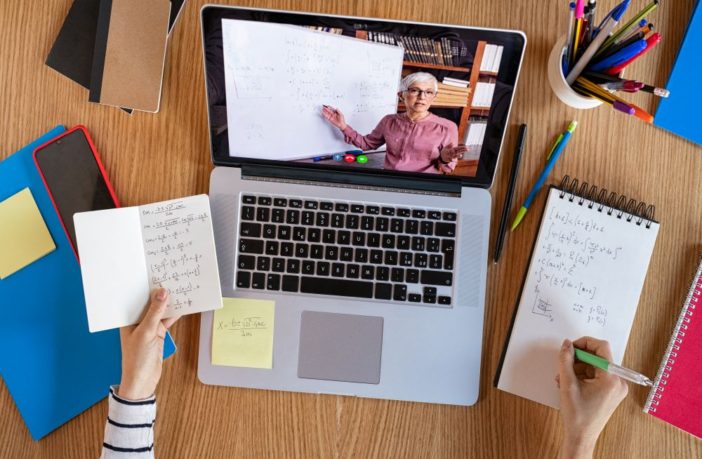‘Enriched realities’ and ‘Using chatbots in learning’ are two of the top ten new approaches to learning and teaching in this year’s Innovating Pedagogy report from The Open University.
The ninth edition of the report launched in January 2021 was produced by leading educational researchers at the OU’s Institute of Educational Technology (IET), in collaboration with researchers from the Artificial Intelligence and Human Languages Lab/ Institute of Online Education at Beijing Foreign Studies University.
Responding to challenges of today
Produced through 2020, this year’s report observes significant gaps in online and blended learning which can be addressed with shifts in educational practice.
Lead author Professor Agnes Kukulska-Hulme, OU Lead in learning Technology and Communication, explains:
“The report introduces ten innovative pedagogies that either already influence educational practice or offer opportunities for the future. By ‘innovative pedagogies’, we mean novel or changing theories and practices of teaching, learning and assessment for the contemporary world, often enabled or supported by technology”.
“Work on this report began in May 2020, at a time of great upheaval and disturbance to normal ways of conducting education, brought about by the Covid-19 pandemic. The pedagogical innovations described in our report are not a direct response to the challenges that so many educators have faced because of this extraordinary situation, but they are certainly relevant to those challenges”.
The 10 highlighted themes in the Innovating Pedagogy report are:
Best learning moments
This theme finds that when people are engaged in an activity that is appropriately challenging to their skill level, they can experience deep involvement which is often accompanied by feelings of enjoyment. This results in full concentration and focus.
Technology enhanced learning (TEL) environments can be designed to create opportunities for best learning moments; for example, through use of mobile devices, games-based learning, immersive experiences, and using data from learning analytics.
Enriched realities
Digital technology plays an increasing role in how our society works and people connect, enriching reality by blending physical and digital domains. When learners cannot be in the same place at the same time, augmented reality (AR) and virtual reality (VR) can be used to make some exciting and memorable shared experiences possible. When we use an AR application, it overlays information on our surroundings or objects around us, while VR provides a three-dimensional environment we can interact with.
Such enriched realities extend what is possible in education and training, allowing users to work together and practise their skills, and opening up opportunities that are not available otherwise (from an operating room, to the surface of Mars or the inside of a volcano). Small-scale use of enriched reality is within reach for learners with access to a suitable smartphone and a good Internet connection.
Gratitude as a pedagogy
This theme proposes that the concept of gratitude can be integrated in learning to promote staff-student partnership, improve mental wellbeing and improve focus and understanding in their learning environment.
After taking part in the gratitude-based learning practice, students reported being more engaged, less distracted, having great motivation for learning, increased confidence and a deeper understanding of concepts. Gratitude has been increasingly included in the professional development of schoolteachers, used in early childhood education and explored in medical practice.
Using Chatbots in learning
Chatbots can support learners by answering and asking questions, providing guidance and assisting in problem solving with text-based or voice-based communication with users. This means that when a teacher is not available or cannot help, learners are still able to make progress. With progressively more useful artificial intelligence to support the user, chatbots bring new opportunities in providing immediate assistance and tailored support.
However, they can require patience and persistence while the technology improves, as well as ethical assurance around ownership and access to data.
Equity-oriented pedagogy
This theme addresses the need for education opportunities to be inclusive of all students, proposing consideration of equality in opportunities to access education, but also equity, whereby each student can achieve similar positive outcomes, regardless of their background and characteristics such as gender, disability or ethnicity.
Strategies in equity-oriented pedagogy include frameworks such as Universal Design for Learning (UDL), which seeks to accommodate individual learning differences and provides principles of curriculum design that focus on offering students multiple means of engagement, representation (e.g. alternative formats), and expression or action.

Hip-hop based education
Education in a variety of forms can promote the empowerment of different learners. Hip-hop based education focuses on the use of hip-hop as a music genre, culture and art movement inside and outside a traditional school or university setting. It uses elements such as rap music texts, videos and performances, graffiti and break dancing in the curriculum and in teaching and learning to provide a culturally appropriate approach that can empower marginalised groups of learners.
Hip-hop based education has been shown to bring benefits that include student engagement and motivation, social and emotional learning, literacy development, critical thinking, and improvement in teacher and student relationships. It is studied within disciplines such as English, sociology, linguistics, dance, anthropology and music.
Student co-created teaching and learning
Student-teacher co-created teaching and learning can lead to greater empowerment, participation and shared responsibility in designing materials, activities and assessment. The theme proposes that co-conceived content within a ‘communities of practice’ can support teamwork, share common interest, and aid improved practice.
While this approach may create challenges for students, such as needing to have particular skills or persistence, when co-creation works well students report positive feelings of enthusiasm and involvement and they can acquire new skills. Co-created materials may also save them having to buy expensive textbooks.
Telecollaboration for language learning
Learning a second language with free-to-use online communication tools has created new opportunities for language learning and cultural learning. Telecollaboration projects can connect learners at a distance, expanding learner vocabulary, cultural awareness and use of the second language with accurate grammar.
Telecollaboration can contribute to building up a student-centred learning environment characterised by peer teaching, autonomous learning, and individualized learning based on learners’ personal interests and needs.
Evidence-based teaching
Evidence-based teaching uses research evidence to inform decisions about the best pedagogical approach to use in teaching a given domain. These evidence-based decisions can help select a certain teaching strategy for a specific topic, capturing the progress students make over time, or assessing the effectiveness of teaching.
Evidence-based teaching can support teachers to identify and apply best teaching practices, debunk harmful myths about teaching, and improve current teaching and learning.
Corpus-based pedagogy
A large collection of texts or other samples of naturally occurring language is known as a corpus. Language teachers, students and developers of teaching materials may access a corpus to obtain authentic linguistic data. The corpus-based approach can be applied in many areas including learning languages for specific purposes, teaching text analysis, support for writing in a particular genre, and scrutiny of existing textbooks.



